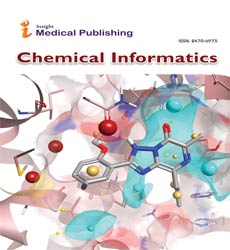Chemical Informatics : Citations & Metrics Report
Articles published in Chemical Informatics have been cited by esteemed scholars and scientists all around the world. Chemical Informatics has got h-index 7, which means every article in Chemical Informatics has got 7 average citations.
Following are the list of articles that have cited the articles published in Chemical Informatics.
| 2023 | 2022 | 2021 | 2020 | |
|---|---|---|---|---|
Published articles |
12 | 31 | 41 | 23 |
Citations received |
10 | 30 | 36 | 23 |
| Journal total citations count | 173 |
| Journal impact factor | 1.00 |
| Journal 5 years impact factor | 0.87 |
| Journal cite score | 0.77 |
| Journal h-index | 7 |
| Journal h-index since 2019 | 6 |
 |
Glossman-Mitnik D (2016) Cheminformatics to Prompt the Process of Drug Discovery. Chem Inform 2: 2. |
| View at Publisher | View at Google Scholar | |
 |
Glossman-Mitnik D (2016) Cheminformatics to Prompt the Process of Drug Discovery. Chem Inform 2: 2. |
| View at Publisher | View at Google Scholar | |
 |
Glossman-Mitnik D (2016) Cheminformatics to Prompt the Process of Drug Discovery. Chem Inform 2: 2. |
| View at Publisher | View at Google Scholar | |
 |
Forfar LC, Murray PM. Meeting Metal Limits in Pharmaceutical Processes. |
| View at Publisher | View at Google Scholar | |
 |
Teng SY, How BS, Leong WD, Teoh JH, Cheah AC, et al (2019). Principal component analysis-aided statistical process optimisation (PASPO) for process improvement in industrial refineries. J Cleaner Prod. 359-375. |
| View at Publisher | View at Google Scholar | |
 |
Pawar G, Madden JC, Ebbrell D, Firman JW, Cronin MT (2019). In Silico Toxicology Data Resources to Support Read-Across and (Q) SAR. Frontiers in Pharmac. 10. |
| View at Publisher | View at Google Scholar | |
 |
Hanley QS(2019). the Distribution of standard Deviations Applied to High throughput screening. Scientific reports. 9(1):1268. |
| View at Publisher | View at Google Scholar | |
 |
Vu O, Mendenhall J, Altarawy D, Meiler J (2019) . BCL:: Mol2D—a robust atom environment descriptor for QSAR modeling and lead optimization. Journal of computer-aided molecular design.33(5):477-486. |
| View at Publisher | View at Google Scholar | |
 |
Ravoof TB, Crouse KA, Tiekink ER, Tahir MI, Yusof EM, et al (2017). Synthesis, characterisation and biological activities of S-2-or S-4-methylbenzyl-β-N-(di-2-pyridyl) methylenedithiocarbazate and Cu (II), Ni (II), Zn (II) and Cd (II) complexes. Polyhedron. 133:383-92. |
| View at Publisher | View at Google Scholar | |
 |
Muttaqin SS, Maji JS (2018). Screening of Oxamic Acid Similar 3D Structures as Candidate Inhibitor Plasmodium falciparum L-Lactate Dehydrogenase of Malaria Through Molecular Docking. In2018 1st International Conference on Bioinformatics, Biotechnology, and Biomedical Engineering-Bioinformatics and Biomedical Engineering . 1, pp. 1-6. IEEE. |
| View at Publisher | View at Google Scholar | |
 |
Glossman-Mitnik D (2016). Cheminformatics to Prompt the Process of Drug Discovery. Chem Inform. 2:2. |
| View at Publisher | View at Google Scholar | |
 |
Rath EC, Gill H, Bai Y (2017). Identification of potential antimicrobials against Salmonella typhimurium and Listeria monocytogenes using Quantitative Structure-Activity Relation modeling. PloS one.12(12):e0189580. |
| View at Publisher | View at Google Scholar | |
 |
Gramatica P, Chirico N, Papa E, Kovarich S, Cassani SQ. QSARINS (QSAR-INSubria). |
| View at Publisher | View at Google Scholar | |
 |
Rath EC. Prevention of Common Pathogens: Development of QuantitativeStructural Activity Relationships for Quaternary Ammonium Compounds againstFoodborne Pathogens and a Computational Analysis of Intergenic sRNA in Streptococcus pyogenes (Doctoral dissertation, Indiana State University). |
| View at Publisher | View at Google Scholar | |
 |
Gramatica P, Chirico N, Papa E, Kovarich S, Cassani SQ. Software for QSAR MLR model development and validation. |
| View at Publisher | View at Google Scholar | |
 |
Glossman-Mitnik D (2016). Cheminformatics to Prompt the Process of Drug Discovery. Chem Inform.2:2. |
| View at Publisher | View at Google Scholar | |
Google scholar citation report
Citations : 173
Chemical Informatics received 173 citations as per google scholar report
Abstracted/Indexed in
- Google Scholar
- China National Knowledge Infrastructure (CNKI)
- Directory of Research Journal Indexing (DRJI)
- WorldCat
- Geneva Foundation for Medical Education and Research
- Secret Search Engine Labs
- CAS (Chemical Abstracting Services)
Open Access Journals
- Aquaculture & Veterinary Science
- Chemistry & Chemical Sciences
- Clinical Sciences
- Engineering
- General Science
- Genetics & Molecular Biology
- Health Care & Nursing
- Immunology & Microbiology
- Materials Science
- Mathematics & Physics
- Medical Sciences
- Neurology & Psychiatry
- Oncology & Cancer Science
- Pharmaceutical Sciences

